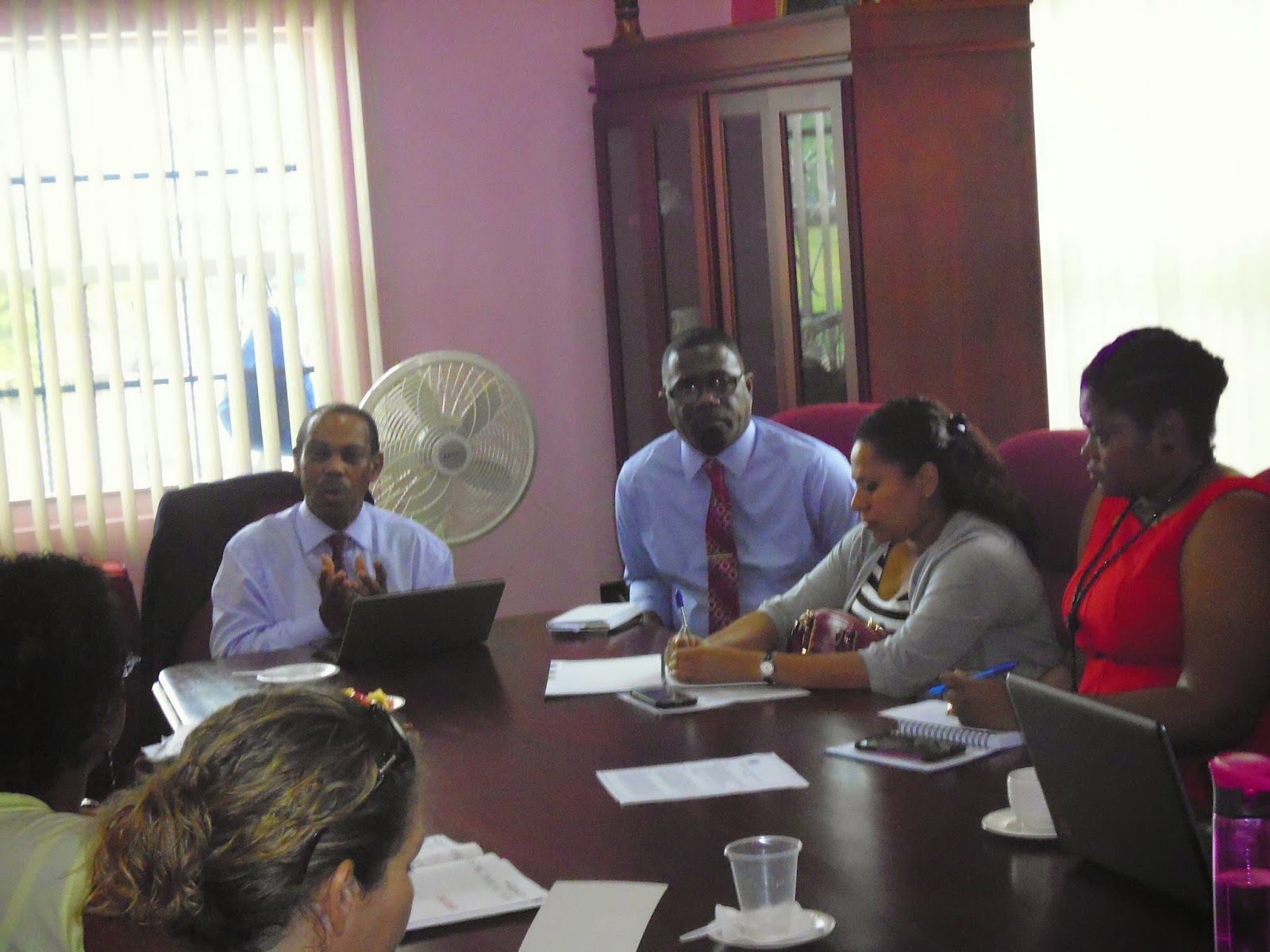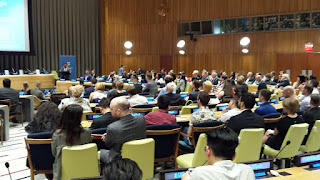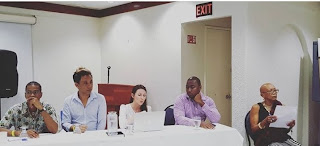Knowing Political Structures to Advance LGBT Rights: Comparative Analysis of the UK, the CARICOM, and Belize
Posted 19th April, 2015
In my years of doing Advocacy, I have met many people with titles, like Chad Griffin of the Human Rights Campaign, UN Special Envoy for the Caribbean Dr. Edward Greene, in Belize. the Canadian High Commissioner and the list goes on. What has not taken place is an analysis of the national and international environment under which L.G.B.T issues must advance. To be clear, this blog is not about making a decision about the rights or wrongs of the past, but offers on prospective, as we seek to advance L.G.B.T concerns in Belize, in networks like CARIFLAGS and engage in international spaces. Advocacy experience teaches that we look at one issue at a time. But can we, as we are one group, in sea of concerns that is affected by history, social marginalisation and possibly Pink-washing. Do we march ahead in our desperate attempt to get protections at any cost, our do we seek a balance. How that will balance out is anyone guess, only time will tell. The references below only offer one layer of why developing countries resist addressing L.G.B.T issues. It is not the only layer in the internationalization of rights.
According to Physician for Social Responsibility report called Body Count (see below for link) that studies the effect of the War on Terror on Iraq, Pakistan and Afghanistan. The Executive Summary report, March, 2015 says:
'This investigation comes to the conclusion that the war has, directly or indirectly, killed around 1 million people in Iraq, 220,000 in Afghanistan and 80,000 in Pakistan, i.e. a total of around 1.3 million. Not included in this figure are further war zones such as Yemen. The figure is approximately 10 times greater than that of which the public, experts and decision makers are aware of and propagated by the media and major NGOs. And this is only a conservative estimate. The total number of deaths in the three countries named above could also be in excess of 2 million, whereas a figure below 1 million is extremely unlikely.'
When one looks at British history, the case of India comes to mind, George MonBiot wrote in 2005;
In his book Late Victorian Holocausts, published in 2001, Mike Davis tells the story of the famines which killed between 12 and 29 million Indians(1). These people were, he demonstrates, murdered by British state policy.
When an El Nino drought destituted the farmers of the Deccan plateau in 1876 there was a net surplus of rice and wheat in India. But the viceroy, Lord Lytton, insisted that nothing should prevent its export to England. In 1877 and 1878, at height of the famine, grain merchants exported a record 6.4 million hundredweight of wheat. As the peasants began to starve, government officials were ordered “to discourage relief works in every possible way”(2). The Anti-Charitable Contributions Act of 1877 prohibited “at the pain of imprisonment private relief donations that potentially interfered with the market fixing of grain prices.” The only relief permitted in most districts was hard labour, from which anyone in an advanced state of starvation was turned away. Within the labour camps, the workers were given less food than the inmates of Buchenwald. In 1877, monthly mortality in the camps equated to an annual death rate of 94%.
The writer article adds, at, '.. least twenty such atrocities overseen and organised by the British government or British colonial settlers: they include, for example, the Tasmanian genocide, the use of collective punishment in Malaya, the bombing of villages in Oman, the dirty war in North Yemen, the evacuation of Diego Garcia.'
...'Under the reign of terror instituted by King Leopold II of Belgium (who ran the Congo Free State as his personal fief from 1885 to 1908), the population of the Congo was reduced by half -- as many as 8 million Africans (perhaps even 10 million, in Hochschild's opinion) lost their lives...' He continues
'..Marchal, the Belgian scholar, estimates that Leopold drew some 220 million francs (or $1.1 billion in today's dollars) in profits from the Congo during his lifetime. Much of that money, Hochschild suggests, went to buying Leopold's teen-age mistress, a former call girl named Caroline, expensive dresses and villas, and building ever grander monuments, museums and triumphal arches in honor of the king...'
Whether these reports are more nuance in complexity in their local political and social environments, the point is made that human rights violations have a long history, as L.G.B.T activists around the world seeks to do international work, they must all understand the context of that history, as work continues in political engagement with power structures that few understand in its complexity.
We don't have a complicated political system in Belize and among the 11 CARICOM member states that criminalised same sex activity. What we have is a challenged in understanding our power structures,rules of parliament, parties and legislative processes at the national level. While at the regional level, its about defining regional vision, common themes in policy advancement, addressing research structures at the political level to make a case for reform; improving knowledge of regional mechanism and power brokers and facilitating sustained regional action. More importantly, we are challenged to recognised the long-term end-game in the region. With all this said, CARIFLAGS offers L.G.B.T issues a regional level mechanism. The question is how do we take advantage of any mechanism?


Mechanisms, it seems, start with understanding, the political structure under which L.G.B.T citizens live. When one look at Westminister and compare political environment of Belize, Jamaica, St. Lucia, Trinidad, Guyana and Belize, activists seems to hold inadequate knowledge of how to engage political systems at home. More precisely, comparative analysis shows us that we have an advantage politically in the following way 1). Our systems of government is centralised 2). We need not duplicate our issues at the national level multiply times. Furthermore, our system does not have four different forms of parliament like the UK has among Scotland, Northern Ireland, England and Wales to engage politically. Looking deeper into Scotland political structures, for example, it seems, after the establishment of Parliament, approving laws must go through the Scottish parliamentary, even if WestMinister approves. A process, which calls for civil society concern about diversity issues to duplicate human and financial resources, to ensure there is rights protection in Scotland.
Further observations revealed that the political power structure have been devolved, making law reform a decentralised process in the UK. For example, a referendum was held on 11 September 1997 to ask the Scottish people whether they wanted a Scottish Parliament and whether it should have tax-varying powers. A clear majority of voters voted yes and in 1998 The Scotland Act became law.
The people of Scotland elects 129 Members of the Scottish Parliament (MSPs). MSPs represent their constituents on devolved matters in the Scottish Parliament in Edinburgh while, an additional, 59 MPs represents Scotland in the House of Commons at Westminster in London. Their role is to represent their constituents on reserved matters. MSPs and MPs are elected by separate general elections.
In addition, with the elections in 2011 in Scotland and the Scottish National Party, a referendum on Scottish independence was tabled to the public. The results, helped to shape efforts on 18 September 2014 to try to transfer further powers to the Scottish Parliament in areas such as taxation, welfare and power’s over Scottish Parliament and local government elections in Scotland.
When Wales is looked at more closely, research revealed that it has a devolved assembly which comprises 60 members, who are known as assembly members, elected for four years, under an additional membership system. 40 represent geographical constituencies and 20 elected by the plurality system while 20 represent 5 electoral regions.The assembly was created by the Wales Act of 1998 following a referendum in 1997. Its primary law-making powers were enhanced following a Yes vote in the referendum on 3 March 2011, making it possible for it to legislate without having to consult, in certain matters, with the UK parliament or Secretary of state for Wales.
At present, the National Assembly for Wales does not have powers in areas of defence, tax or welfare benefits. In March, 2011 the voters of Wales support the referendum so the Assembly could make laws for 20 subject areas, such as agriculture, education, the environment, health, housing, local government.
When the Parliament of Northern Ireland was established by the Government of Ireland Act 1920, it was intended to establish two devolved Parliaments, within the UK and lasted till 30th March, 1972 when the Act was suspended to introduced direct rule from Westminister. This ended 8th May, 2007 when parliamentary arrangements devolved to include 15 areas called transferred matters while West Minister retained control over 12 expected matters areas, like defence, constitution, international relations, currency, security, energy, international treaties, conferring honours. There is also a reference to reserve matter which has 11 areas that the Northern Ireland can legislate with consent from WestMinister.
Analysis of the UK political system revealed that UniBAM does not have four systems of parliament that it needs to address in advancing its concerns around L.G.B.T human rights, neither does St. Lucia, Jamaica, Trinidad nor Guyana, as all have one central government. What is clear is that activist and organizations alike need not duplicate resources and political mobilisation to address national anti-sodomy or buggery laws or to address concerns about discrimination or violence legislation. What we need to understand in our countries are the political rules at the national level like 1)Who are the power brokers in each political party. 2).Who helps to lead and shape a party's manifesto. 3).When does the manifesto development occur. 4). Establish how L.G.B.T organization can help to influence the contents of the manifesto. 5). Develop intimate political engagement processes to improve politicians knowledge and response to L.G.B.T citizens and 5). Study legislative procedures and identify a political champion to act.
Beyond this, L.G.B.T organizations in the region have not advance legal capacity to 1). Analyzed constitutional frame works to identified legal gaps in national subsidiary laws, 2). Improved knowledge about the rules of national parliaments legislative processes 3). Identified, sufficiently, the power brokers who drive legislative development nationally and regionally. 4). Identified, the mechanisms that drive reform at national and regional spaces.
While litigation on Belize and Trinidad and Tobago Immigration Act is still on-going at the Caribbean Court of Justice, legal processes are on-going in Guyana (cross-dressing case) and in Jamaica ( media challenge) and Belize section 53. Litigation, is just one strategy in the fight to sustain calls to action for political acknowledgement and policy advancement. In Belize, we have complimented litigation with public education using art, pride events, ADS, conferences to amplify its public education work. What we have seen, is the the region and small countries like Belize have moved faster on the use communication plans to complement its litigation strategy.


The policy frame work of the directive, gave life as well to 2007 legal amendments which made it illegal to discriminate against people because of their sexual orientation when providing them with goods or services. The 2008 Criminal Justice and Immigration Act added a new criminal offence of ‘incitement to homophobic hatred.’ The amendments spoke to behaviour or materials which stirred up hatred towards gay people. Reproductive rights was never far behind in the advancement of Civil rights issue for L.G.B.T citizens as a 2009 law made it easier for same sex couples to both be recognised as the legal parent of their child. Push Forward 2010 and we have the Equality Act of 2010 which supersedes the regulations and sought to centralise the issues of equality under one law[7]. The Equality Act 2010 was intended to replace over 100 acts of parliament, regulations and judicial clarifications. The framework for equal rights protection in Britain can be traced back to the 1960's and 1970's and the Labour Government of Harold Wilson. Further traces of addressing equality can be found in the Representation of the People Act in 1928 – which finally gave equal voting rights to women. The legislative road began with the first Race Relations Act in 1965 which was updated in 1976 – followed by the Equal Pay Act in 1970-The Sex Discrimination Act in 1975. The efforts at reform followed similar forms of protection introduced in the United States a decade prior. Indeed these three Acts of Parliament (Pay, Sex, Race), plus a few accompanying regulations, were all you needed to know about Equality in the 1970's and for almost two more decades. With Britain becoming a member of the European Community in 1972 and which became the European Union in 1992 with the signing of the Maastricht Treaty, the conservative government opted out of the social Chapter of the Treaty which includes references to anti-discrimination. Nevertheless, the conservative government did enact the Disability Discrimination Act in 1995. It was not until Tony Blair's "New Labour" government won the 1997 election that the UK opted in to the social provisions of EU law.
Also see:
Beyond this, L.G.B.T organizations in the region have not advance legal capacity to 1). Analyzed constitutional frame works to identified legal gaps in national subsidiary laws, 2). Improved knowledge about the rules of national parliaments legislative processes 3). Identified, sufficiently, the power brokers who drive legislative development nationally and regionally. 4). Identified, the mechanisms that drive reform at national and regional spaces.
While litigation on Belize and Trinidad and Tobago Immigration Act is still on-going at the Caribbean Court of Justice, legal processes are on-going in Guyana (cross-dressing case) and in Jamaica ( media challenge) and Belize section 53. Litigation, is just one strategy in the fight to sustain calls to action for political acknowledgement and policy advancement. In Belize, we have complimented litigation with public education using art, pride events, ADS, conferences to amplify its public education work. What we have seen, is the the region and small countries like Belize have moved faster on the use communication plans to complement its litigation strategy.


The use of litigation is not unique among CARICOM member states, nor in Belize which leads the region with two litigation efforts at the regional and national court system. In the UK, for example, the combine efforts of Dudgeon v UK, legislation followed, the establishing of Age of Consent, Military Service and Immigration. Litigation work at the European Court of Human Rights around age of consent, was advanced by Sutherland v UK in (1996); litigation around military service which spoke to cases that violated Article 8 of the Convention – the right to a private life. The cases were Lustig-Prean and Beckett v UK (1999)[1], Smith and Grady v UK (1999)[2], Perkin and R v UK (2002) and Beck, Copp and Bazeley v UK (2002)[3]. For Darienne Flemington, immigration case,on 4 August 1994, the Home Office finally granted leave to remain in the UK . The couple, lobbied and appealed through the courts, founded the Stonewall Immigration Group – now the UK Lesbian and Gay Immigration Group[4] – many members were deported, put in prison for false documents or false marriages.[5] The group reported that lobbying Labour while still in opposition resulted – after their election – in the “unmarried partner’s concession”. At the outset in 1997, 4 years of prior cohabitation was required to qualify, reducing to 2 years in 1999, with the concession becoming law in 2000. In November 2004, the Civil Partnership Bill was passed. Once this legislation came into use in December 2005, it ensured equal immigration rights for same sex couples. Offering, a strategy shift in L.G.B.T rights advancement.
The second shift that highlights an important policy movement event was the European Directive of 2000, in regards to employment and discrimination. The European Directive (2000/78/EC of 27 November 2000)[6] in regards to employment and discrimination spoke to religions belief, race, gender, disability, age and sexual orientation. A process, that recognised the intersectional issues of race, sexuality, gender, religion and disability, helped to advance the centralisation and prioritisation around policy and advocacy engagement in the political environment in parliament.
The policy frame work of the directive, gave life as well to 2007 legal amendments which made it illegal to discriminate against people because of their sexual orientation when providing them with goods or services. The 2008 Criminal Justice and Immigration Act added a new criminal offence of ‘incitement to homophobic hatred.’ The amendments spoke to behaviour or materials which stirred up hatred towards gay people. Reproductive rights was never far behind in the advancement of Civil rights issue for L.G.B.T citizens as a 2009 law made it easier for same sex couples to both be recognised as the legal parent of their child. Push Forward 2010 and we have the Equality Act of 2010 which supersedes the regulations and sought to centralise the issues of equality under one law[7]. The Equality Act 2010 was intended to replace over 100 acts of parliament, regulations and judicial clarifications. The framework for equal rights protection in Britain can be traced back to the 1960's and 1970's and the Labour Government of Harold Wilson. Further traces of addressing equality can be found in the Representation of the People Act in 1928 – which finally gave equal voting rights to women. The legislative road began with the first Race Relations Act in 1965 which was updated in 1976 – followed by the Equal Pay Act in 1970-The Sex Discrimination Act in 1975. The efforts at reform followed similar forms of protection introduced in the United States a decade prior. Indeed these three Acts of Parliament (Pay, Sex, Race), plus a few accompanying regulations, were all you needed to know about Equality in the 1970's and for almost two more decades. With Britain becoming a member of the European Community in 1972 and which became the European Union in 1992 with the signing of the Maastricht Treaty, the conservative government opted out of the social Chapter of the Treaty which includes references to anti-discrimination. Nevertheless, the conservative government did enact the Disability Discrimination Act in 1995. It was not until Tony Blair's "New Labour" government won the 1997 election that the UK opted in to the social provisions of EU law.
The UK had the European Convention and the 2000 European Directive, Belize has, made used of the Organization of American States General Assemblies, the Inter-American Commission, thematic hearings, the Universal Periodic Review of 2009 and 2013 as well as the International Covenant on Civil and Political Rights Shadow report processes to amplify political engagement nationally. The results can be seen in the PM Barrow, 2013 independence day speech, the leader of the opposition comments and extended invitations to contribute to the consultations processes for the country national report.
The third shift, in UK L.G.B.T history is that politicians have been coming out the closet in all parties which meant in practice that no party owned the the equality and diversity issued. Of note, Union representations, pointed out that there was an L.G.B.T committee in every major party and that dialogue and engagement does happen across party lines. We don't have out MP's in Belize or in any country among CARICOM member states, we have rumors only. What is interesting is that Belize is at a place where the UK was 30 years ago, where one's private business remain private, even if a person is a public secret. We don't have an L.G.B.T committee to advance political engagement within both parties and we have not successfully engagement in manifesto development between the parties that exists and we have not engage the legislative process in any significant way as yet. What I can say we have done is change the political tone in the country, but not the substance. The sky is the limit in how we push forward to extend legislative protections.
The third shift, in UK L.G.B.T history is that politicians have been coming out the closet in all parties which meant in practice that no party owned the the equality and diversity issued. Of note, Union representations, pointed out that there was an L.G.B.T committee in every major party and that dialogue and engagement does happen across party lines. We don't have out MP's in Belize or in any country among CARICOM member states, we have rumors only. What is interesting is that Belize is at a place where the UK was 30 years ago, where one's private business remain private, even if a person is a public secret. We don't have an L.G.B.T committee to advance political engagement within both parties and we have not successfully engagement in manifesto development between the parties that exists and we have not engage the legislative process in any significant way as yet. What I can say we have done is change the political tone in the country, but not the substance. The sky is the limit in how we push forward to extend legislative protections.
[1] Lustig-Prean&Beckettv UK: http://hudoc.echr.coe.int/sites/eng/pages/search.aspx#{"appno":["32377/96"],"
itemid":["001-58407"]}
[2] Smith & Grady V UK:
http://hudoc.echr.coe.int/sites/eng/pages/search.aspx?i=001-58408#{"itemid":["001-58408"]}
[3] Beck,Copp and Bazeley v UK:
http://hudoc.echr.coe.int/sites/eng/pages/search.aspx?i=001-60697#{"itemid":["001-60697"]}
Scotland Act 1998: http://www.scottish.parliament.uk/help/61877.aspx
Welsh power:
http://en.wikipedia.org/wiki/National_Assembly_for_Wales
Northern Ireland:
https://www.gov.uk/devolution-settlement-northern-ireland
Physician for Social Responsibility
http://www.psr.org/resources/body-count.html
Geroge Monbiot
http://www.monbiot.com/2005/12/27/how-britain-denies-its-holocausts/
Michiko Kakutani
https://www.nytimes.com/books/98/08/30/daily/leopold-book-review.html
Recent Developments and Set backs
https://www.hoganinjury.com/lgbt-rights-recent-developments-and-setbacks/
Physician for Social Responsibility
http://www.psr.org/resources/body-count.html
Geroge Monbiot
http://www.monbiot.com/2005/12/27/how-britain-denies-its-holocausts/
Michiko Kakutani
https://www.nytimes.com/books/98/08/30/daily/leopold-book-review.html
Recent Developments and Set backs
https://www.hoganinjury.com/lgbt-rights-recent-developments-and-setbacks/












Comments
Post a Comment